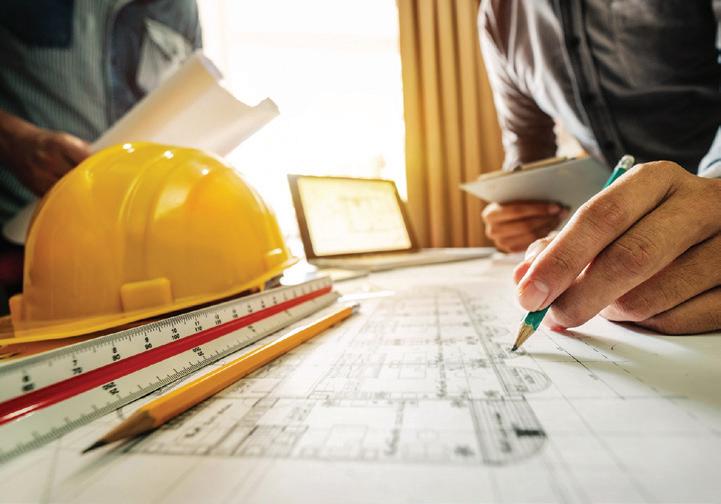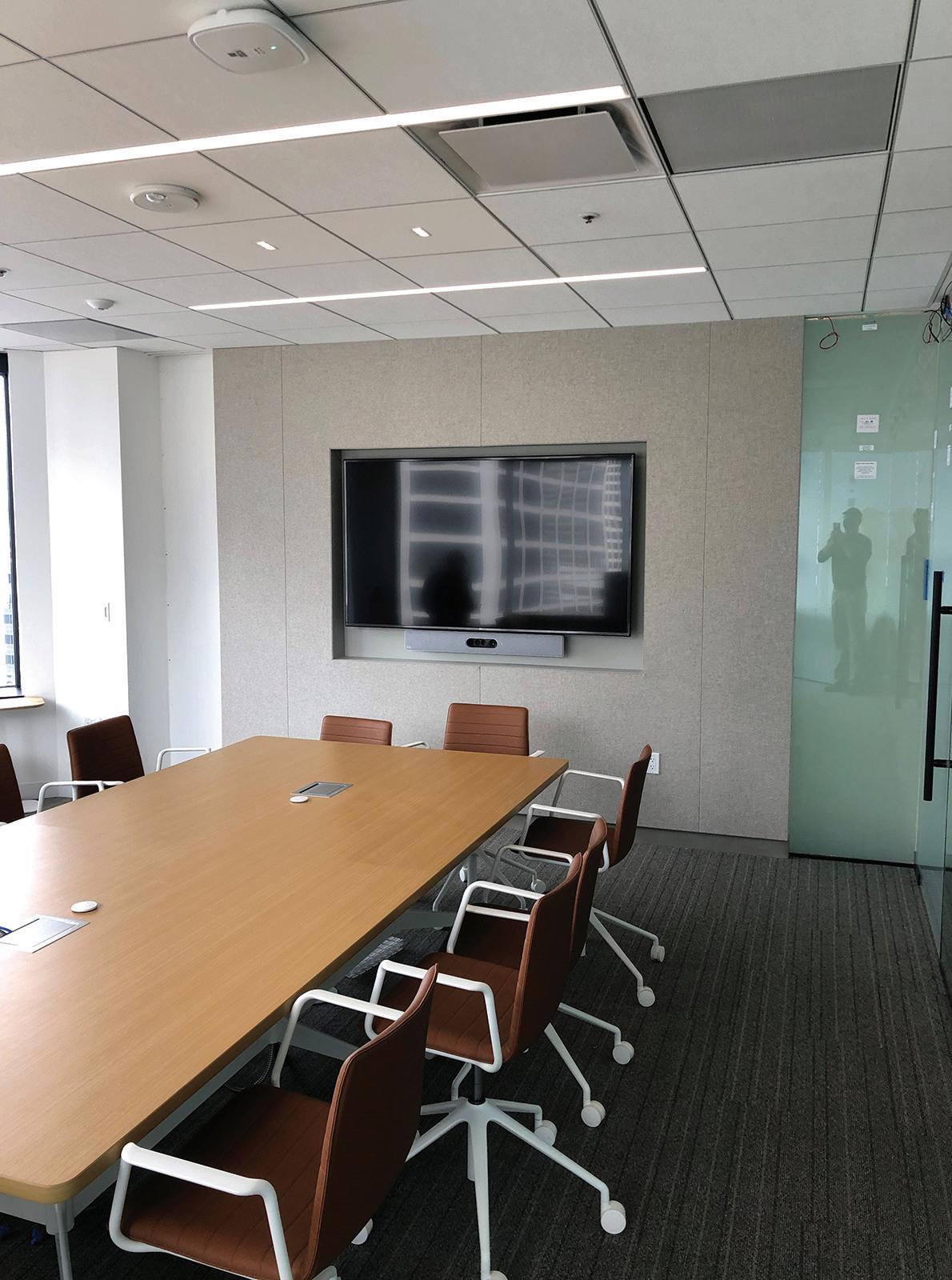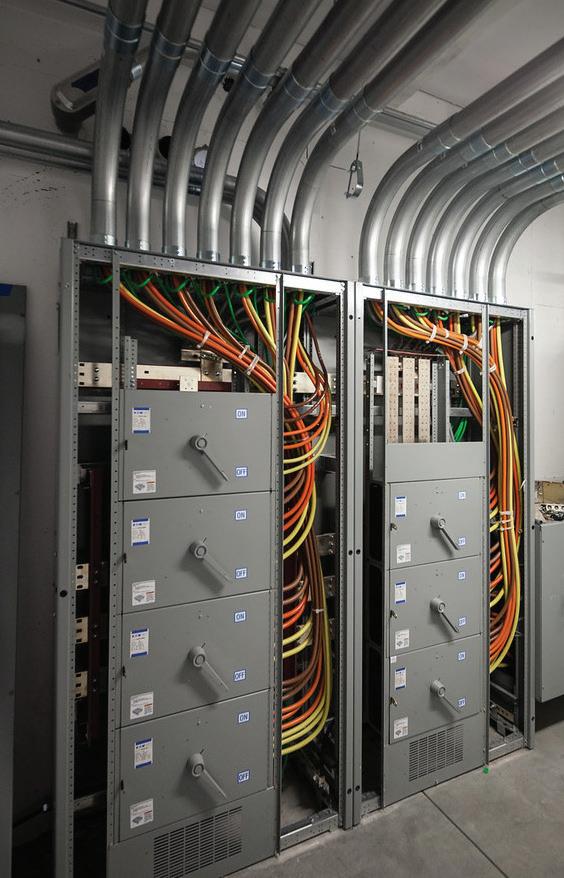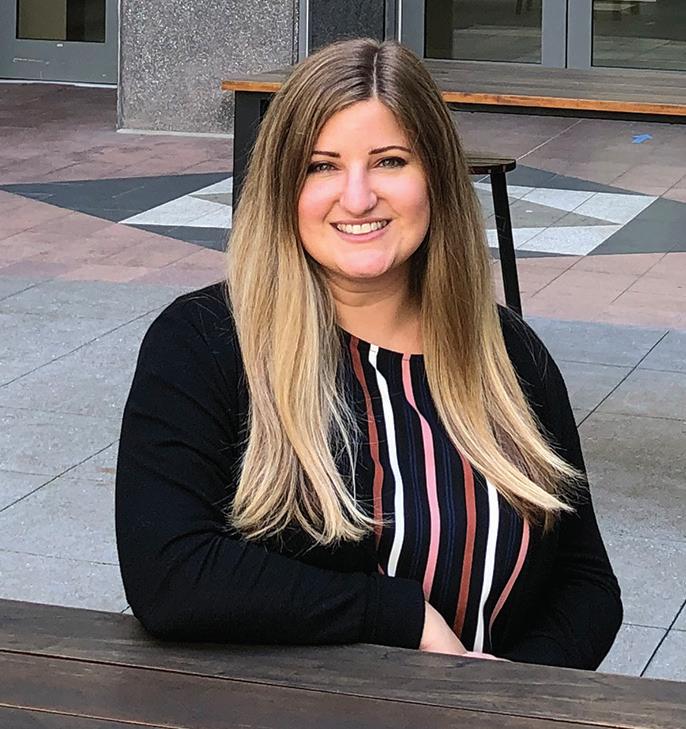
12 minute read
Permits: What’s New?
Building Codes: Update on Permitting Processes
Construction activity has continued throughout the pandemic and may be on the up-tick as contractors, architects and building managers prepare for increased occupancy and consider retrofits that ensure safe and healthy workplaces. BOMA members are eager to have projects move expeditiously through the City’s permitting and other processes. BOMA San Francisco’s Codes & Regulations Committee is at the forefront in sharing members’ concerns about permitting with the City’s Department of Building Inspection (DBI) and other relevant departments and providing input on our association and industry. (See Q&A below with DBI.)
Codes & Regulations Committee Chair James Kilroy says there is a backlog of permit applications in the system that are waiting to be processed. BOMA members relied on convenient over-the-counter (OTC) permitting services at DBI prior to March 2020. Most procedures then moved online, with activities like plan checking done electronically. These revamped procedures sometimes delayed projects, as building professionals could not meet face-to-face with staff and get feedback and guidance right away.
Codes committee members look forward to having OTC permitting live again. As restrictions are eased and tenants return, TI work will be needed, especially in lobbies and cafeterias, as well as mechanical upgrades. Data centers are also a growth area.
The Codes & Regulations Committee’s mission is to provide members with information regarding codes, building permit procedures and policies. It is the primary committee connecting BOMA San Francisco with the San Francisco Building and Planning Departments, the Building Inspection Commission, the Access Appeals Commission, the City’s Code Advisory Committees, and other bodies representing building codes and code enforcement at the state and local level.
If you’d like to participate in the committee’s activities, see the Get Involved section on the BOMA SF website or email James Kilroy at jkilroy@425marketst.com. And be sure to attend the annual Codes Seminar in the fall.
San Francisco’s Department of Building Inspection provided an update for BOMA members.
Q: BOMA members have experienced delays in the City’s permitting process Q&A during the pandemic. How can they work with DBI to expedite approval with SF for new permits and revisions to DBI existing permits? A: To comply with public health directives, DBI suspended in-person Over-the-Counter with plans service at the start of the Covid shutdown last March. Since then, we have relied on a drop-off system with staff, instead of the applicant, circulating the plans to the various permitting offices. This isn’t an ideal situation for anyone— not the customer, the contractor or our staff. The good news is that since May 10, DBI has expanded in-person service for people seeking “Over-the-Counter with plans” permits. Customers can schedule an appointment with DBI or drop in the same day to submit their permit application and personally circulate the plans to the various plan reviewers from DBI and other City permitting departments stationed at the Permit Center. This saves everyone a lot of time. There really is no substitute for meeting in-person with our Over-the-Counter customers to review their plans — this is how our Permit Center was always intended to operate. The expanded service gives greater control to the applicant and allows applicants to engage with plan reviewers, answer questions and address code issues directly instead of waiting for written comments. As for how BOMA members can expedite the process, we strongly encourage customers to submit well-designed projects with plans that clearly adhere to state and local building codes and regulations. Plans that are missing information, feature elements that don’t appear to conform to code, or fail to include a required element will prevent or delay permit issuance. Applicants should consider engaging a design team well-versed in local building regulations, which can go beyond state regulations and often vary greatly between municipalities.
Q&A with DBI (Continued from page 5)
Q: When does DBI expect to resume live Over-the- and outdoor space-conditioning, water heating, cooking Counter appointments? and clothes-drying systems. The ordinance also prohibits A: We’ve already started! We have been welcoming the installation of infrastructure, piping systems, or piping in-person customers for a few weeks and will continue to for distribution of natural gas, or propane—reflecting expand our services in the coming weeks and months as increasing evidence of the risks to human health and safethe health directives allow. ty caused by natural gas and the growing risks from Q: There are a lot of permits in the pipe- climate change. DBI has adopted Administrative line now. And as the economy reopens, Bulletin AB-112, providing detailed guidelines building professionals are planning on how to implement these newly-passed tenant improvements and other “We have expanded All-Electric new construction regulations. projects. Will DBI be adding staff and expanding its hours? our in-person service DBI and the Department of Environment held webinars on the implemenA: We have expanded our in-person and are working hard tation of the ordinance and will hold service and are working hard to pro- to process both new more in the future. cess both new projects and those projects and those Q: Also at the seminar, DBI staff that are already in our system. We that are already in mentioned deadline extensions for are also making operational improve- our system.” soft-story retrofits and the Accessibility ments to better serve our customers Business Entry program. Any updates on as we transition to a full re-opening these deadlines? when the health directives allow for it. A: Property owners have until September 1, We have added several plan checkers to our 2021 to obtain the building permits required to team and continue to recruit for additional plan make their business entrance fully accessible to persons checkers to expand capacity and decrease wait times. In with disabilities. For more information about the program addition, we’ve been encouraging plan checkers to work including building categories, exemptions and waivers, you overtime to help us process more permits. can find it here: Accessible Business Entrance Program. Q: Are there plans to enhance the electronic plan review As for the soft-story retrofit program, the completion processes and any other technologies? of work and issuance of final completion deadline was A: Yes! We expanded Electronic Plan Review (EPR) in early extended to Sept. 1, 2021 for Compliance Tier 4 buildings, May to additional permit types and will continue to add or any building containing ground floor commercial uses more permit types over the next few months. We are taking (Building Code Occupancy B or M), or any building in a a phased approach to ensure the process works smoothly. mapped liquefaction zone. For more information on that We are always looking to leverage technology to be more program, please see: For Property Owners | Department of efficient and effective. In March, 65% of all the permits we Building Inspection (sfdbi.org). issued were issued online (trades permits and reroofing) Q: Are there other developments you would like to share or through Electronic Plan Review. We will soon be adding with the BOMA community? bathroom and kitchen remodel permits to the online A: It has been a long and trying year for all of us. We appresystem—and estimate that will happen in the next 2-3 ciate BOMA’s partnership and patience as we, and the months. entire city, continue to reopen. We were thrilled to begin Q: At the BOMA Codes & Regulations Seminar last fall, the transition back to our efficient Over-the-Counter serDBI reported on the all-electric new construction vices and to expand electronic plan review for more permit ordinance and applications for building permits for new types. We believe working with applicants in-person and building construction after June 1, 2021. Any updates to ramping up our electronic plan review system provide a this development? higher level of satisfaction both for our customers and A: Supervisor Rafael Mandelman‘s “All Electric” Ordinance employees. We are excited to provide BOMA members with requires all new buildings, residential and non-residential, that in-person experience once again and look forward to that apply for initial building permits on or after working together. z June 1, 2021 to be all-electric. This applies to all indoor
Special Sponsored Report The Post-Pandemic Office:
Restructuring for Remote and Transient Workers

As employees return to the office, many workplaces handle more traffic with low latency. WiFi heat-mapping, will need to adapt to a new normal. For example, network design, and installation will be required to ensure workers may split time between a the correct quantity and locations of remote office and in-office time, access points and hardwired LAN requiring more hot-desks. A larger connections that are installed for percentage of meetings will include optimal coverage and performance. one or more remote participants, Meeting rooms and office spaces driving the need for huddle and small with poor acoustics affect not only conference rooms. Some offices the audio quality in a call but also may require the ability to start and the well-being of workers within run meetings without touching a the spaces. Poor acoustics can be controller, and conference rooms easily remedied by installing lowwill be required to support a mix of cost acoustic panel kits and conferencing solutions such as Zoom, sound-masking systems. Microsoft Teams, Google Access Control and Meet, etc. Electrical Upgrades
“We are working with our Access control systems can be customers to ensure that their elec- modified or upgraded to enforce trical and communications solutions wellness attestation via are restructured efficiently,” says mobile phone to allow Young Electric and Communications AV Manager Jerry Richardson. Conference rooms need to support a mix of access to the workplace. Additionally, access
Young Electric and Communications solutions and handle control systems can be provides expert design, project man- more robust traffic. cloud-based, reducing agement, installation and service for Facilities like labs the need for techniElectrical, AV, Acoustics, Data, WiFi, require more power. cians to come on site Security, and DAS. Our integrated and allow doors to be approach to managing all trades under one roof ensures opened or secured the best possible coordination, as well as multi-trade cost remotely. savings. Below are some of the most in-demand solutions Electrical adds, and upgrades that customers may need in the new normal. moves and changes Changing Networking and Acoustics Needs may require as little
With the increased reliance on video conferencing, as re-configuring a power outlet to adding power in new corporate LAN and WiFi networks will be required to locations, to relocating or adding lighting fixtures.


Learn more about how to power your world with our turnkey services:
Principal Member Profile Caroline Grafft, Senior Property Manager Hudson Pacific Properties
Overseeing three San Francisco assets — Rincon Center, 625 2nd Street and 275 Brannan — keeps Senior Property Manager Caroline Grafft busy and motivated. She describes her role at Hudson Pacific Properties: “I focus on executing our business plans, which includes partnering with our leasing and construction departments. I also focus on professional development within our team.” A second-generation CRE professional, Grafft reflects on some recent positive lessons. “I think we can learn a lot from the past year. Real estate has historically been a face-to-face industry. With technology and the change in tenant make-up, working remote is a natural progression,” she says. “Many of our tenant contacts oversee multiple offices and often are not physically on site. Technology allows for synchronized workflows, and I have seen an
Grafft at Rincon Center, increase in our productivity.” which she manages. “We talk to our tenants more because it’s convenient to jump on a Zoom or Teams call,” she adds. “Tenant relations will always be about building relationship based on trust. If you are checking in regularly and providing clear and timely communication, tenants will trust you. We will always need to be at the properties, but it won’t be like it was before. Flexible working isn’t going away, and companies have an opportunity to remain flexible as we reintegrate back to the office. I believe those who remain flexible and place a high value on work-life balance will attract better talent and have higher retention rates over the next 5-10 years.”
Recently Grafft spearheaded the BOMA SF Book Club launch. “Professional development has always been important to me, and the book club is a way to do that collaboratively across the industry,” she says. “I hope that leaders from all different levels will gather to discuss the best practices for leadership. We have a lot to learn from our industry veterans, and I am excited for the next generation of leaders to push the envelope and make the CRE industry an even better place to work.”
When she’s not at one of her buildings, you can find Grafft walking around the East Bay to hit 10,000 steps a day, recording an episode for her podcast, “Conversations with Caroline,” or leading a group at her church.


Thank you to the essential workers that have kept us safe.
Engineering | Janitorial | IFM | Sustainability | 800. 461. 9033 | ableserve.com
Associate Member Profile
Tom Arnold, CEO, Gridium
Self-described environmental entrepreneur Tom Arnold, CEO of Gridium, says he “stays focused on ‘doing well by doing good.’ Entrepreneurship is always hard, but I try to find problems to work on where the pursuit of building the business produces benefits for the environment and the world. That’s very motivating to me and the staff of Gridium. As an example, our partnership with building customers is on track to reduce 80,000 metric tons of CO2 this year.” Gridium’s software helps customers reduce operational expenses, and its financing and project development team helps improve a building’s equipment without touching the budget. “That’s pretty attractive, as we have the dual pressures of COVID costs concerns and a real acceleration of sustainability demands from tenants and capital investors,” Arnold explains. Many BOMA members rely on the company’s expertise in energy management, building operations and sustainability. In his role leading Gridium, Arnold spends as much time as he can with customers.
Arnold enjoyed a 500-mile “This is a unique time in our industry, and sometimes customers need a sounding board bike trip in Mongolia. on energy strategy, or a specific energy question that is difficult to answer. I also ensure that the financing facilities are running smoothly so we can offer zero capital expenditure upgrades to our customers,” he adds.
Arnold lends his environmental knowledge to his service as vice chair of the BOMA SF Energy & Environment Committee. “Our chair, Ana Duffy, and I are focused on San Francisco’s Climate Action Plan, which will set the next set of regulations to meet the City’s greenhouse gas goals. BOMA members have led the nation in sustainability, so there are ample shared goals, but also some concerns about the feasibility and time-lines of eliminating natural gas in our buildings.”
To escape, he loves camping with his family and bike-packing long distances. In 2019 he rode a 500-mile loop around northern Mongolia and this summer looks forward to riding 800 miles from Montana to the Colorado border.






